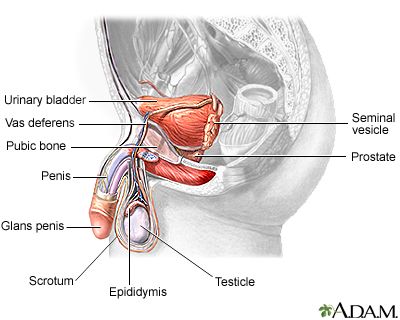Testicular Cancer

What is Testicular Cancer?
Testicular cancer is a type of cancer that develops in the testicles, which are the male reproductive organs responsible for producing sperm and testosterone. It is relatively rare compared to other forms of cancer but is the most common cancer in males between the ages of 15 and 35. Testicular cancer typically starts in the cells that produce sperm and can manifest as a lump or abnormal growth in the testicles.
Who's at risk for Testicular Cancer?
Testicular cancer primarily affects young and middle-aged men, with the highest incidence occurring between the ages of 20 and 34. Certain risk factors increase the likelihood of developing testicular cancer, including a family history of the disease, an undescended testicle (cryptorchidism), abnormal testicular development, personal history of testicular cancer, and certain genetic conditions like Klinefelter syndrome. White men have a higher risk compared to men of other ethnic backgrounds.
What causes Testicular Cancer?
The exact cause of testicular cancer is not well understood, but researchers believe that a combination of genetic and environmental factors contribute to its development. Genetic mutations or alterations may play a role in the abnormal growth of testicular cells, leading to cancer. Additionally, exposure to certain environmental factors such as prenatal or early-life exposures to endocrine disruptors, as well as conditions like cryptorchidism, are thought to increase the risk of developing testicular cancer.
How does Testicular Cancer start?
Testicular cancer usually originates from germ cells, which are responsible for sperm production. These cells may undergo genetic changes that cause them to multiply uncontrollably and form a tumor within the testicle. The tumor can then grow and potentially spread to other parts of the body if left untreated. Testicular cancer may be detected as a painless lump or swelling in the testicle, which prompts further investigation and diagnosis.
What are the symptoms of Testicular Cancer?
In many cases, testicular cancer may not present any noticeable symptoms. However, some common signs and symptoms may include a lump or swelling in either testicle, a feeling of heaviness or discomfort in the scrotum, pain or aching in the testicle or scrotum, changes in testicle size or shape, and a buildup of fluid in the scrotum. It is important to note that these symptoms can also be caused by conditions unrelated to cancer, but they should be evaluated by a healthcare professional.
How is Testicular Cancer diagnosed?
The diagnosis of testicular cancer involves a combination of physical examination, medical history review, imaging tests, and laboratory analyses. A healthcare provider will perform a physical examination to check for abnormalities in the testicles, such as lumps or swelling. Imaging tests such as ultrasound may be conducted to evaluate the testicles and surrounding structures. Blood tests, including tumor marker measurements such as alpha-fetoprotein (AFP) and human chorionic gonadotropin (HCG), may be ordered to assist in the diagnosis and staging of testicular cancer.
How can Testicular Cancer be treated?
The treatment of testicular cancer depends on several factors, including the type and stage of the cancer, as well as the individual's overall health. The primary treatment options for testicular cancer include surgery, chemotherapy, and radiation therapy. Surgery typically involves the removal of the affected testicle (radical inguinal orchiectomy). Additional treatments, such as chemotherapy or radiation therapy, may be recommended based on the stage and spread of the cancer. In some cases, a multidisciplinary approach involving surgery, chemotherapy, and radiation may be used.
What complications may occur with Testicular Cancer?
Complications associated with testicular cancer and its treatments can vary. In some cases, the removal of one testicle may affect fertility, but the remaining testicle can still produce sufficient amounts of testosterone and sperm. In more advanced cases or if the cancer has spread, additional complications may arise, such as the spread of cancer to other organs, impaired fertility, and the potential need for further treatments or surveillance.
How can I prevent Testicular Cancer?
While testicular cancer cannot be entirely prevented, there are steps that individuals can take to help identify potential issues early. Performing regular self-examinations of the testicles can help detect any abnormalities or changes. This involves feeling the testicles for lumps, swelling, or other changes in size, shape, or consistency. If any concerns are identified, it is important to seek medical attention promptly. Regular check-ups with a healthcare professional and discussions about personal risk factors can also help identify potential risk factors and develop an appropriate screening plan.
Long-term management of Testicular Cancer
Long-term management of testicular cancer typically involves regular follow-up appointments and surveillance to monitor for any recurrence or new developments. These appointments may include physical examinations, blood tests, imaging tests, and discussions about any ongoing symptoms or concerns. Depending on the specific case, additional treatments such as chemotherapy or radiation therapy may be recommended. Psychological support, fertility preservation discussions, and addressing potential late effects of treatment are also essential aspects of long-term management.
What is recent research saying about Testicular Cancer?
Recent research on testicular cancer has focused on improving diagnostic techniques, understanding genetic factors, and developing targeted therapies. Advances in genetic testing and analysis have provided insights into the genetic changes associated with testicular cancer, enabling better understanding of its causes and potential targets for treatment. Additionally, research efforts are focused on developing more precise and effective treatments while minimizing long-term side effects. Studies are also exploring the impact of lifestyle factors and potential prevention strategies for testicular cancer.
Where can I go for more information on Testicular Cancer?
For more information on testicular cancer, reliable sources such as the American Cancer Society (ACS), National Cancer Institute (NCI), or Testicular Cancer Society (TCS) can provide valuable information. These organizations offer resources on testicular cancer, including detailed information on diagnosis, treatment options, support services, and ongoing research. Local healthcare providers, oncologists, and urologists can also serve as important sources of information and support for individuals seeking more specific and personalized guidance regarding testicular cancer.

